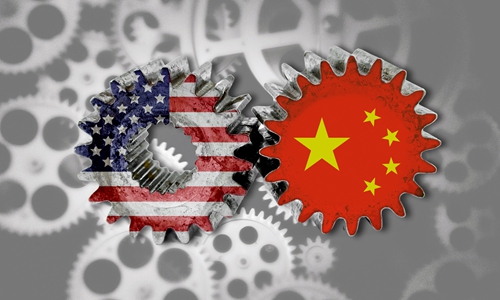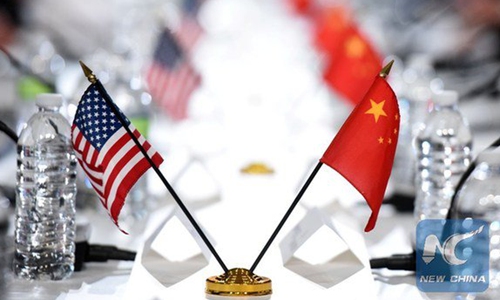HOME >> CHINA
China emerges stronger from trade war with US: poll
By GT staff reporters Source:Global Times Published: 2019/12/21 16:01:52

China has manifested growing strength in China-US competition, and that the essense of the trade war initiated by the US is targeted toward the economy and high technology, a Global Times' survey showed.
The survey further revealed some countries have clearly realized the US' hegemony and China's indomitable fight against the US' hegemony has been recognized worldwide.
The poll was conducted from November 20 to December 3 by the Global Times' Global Poll Center wherein the respondents were residents aged above 18 in 17 countries across five continents including China, the US, UK, France, and Japan. The poll collected response to 17,496 questionnaires.
While selecting the countries, the survey took into account the newly-emerging economies, important neighboring countries, major world powers, developing countries and countries along the China-proposed Belt and Road Initiative.
Around 59 percent of residents in 17 countries surveyed believed that China-US relations are the most influential bilateral relation in today's world. The survey showed that the influence of China-US relations on public opinions could to some extent prevent the two countries from falling into the trap of conflicts and confrontations. And mutual respect, understanding and joint development conform to the global mainstream opinion.
The trade war initiated by the US is the most high-profile head-to-head tiff between China and the US in 2019.
The survey showed that almost 60 percent of the respondents believe China's strength has mounted dramatically during the China-US friction although the US is still in a strong position, up 11.4 percent compared with the 2018 survey.
The acknowledgment of China's growing strength in the wake of the China-US battle is a reflection of the 17 countries' residents recognizing the growth of China's overall national strength and global position.
Nature of trade war
In response to the question regarding the nature of the China-US trade war, around 40 percent chose the economic battle, around 35 percent chose technology, around 31 percent went for the containment of China while the rest opined trade protectionism.
More than 62 percent of Kenyan respondents agreed that the nature of the China-US trade war is essentially a competition in high technologies. The percentage of respondents agreeing with the idea exceed 40 percent in some other countries including South Africa, Spain, India and Indonesia.
The US is containing China's technological development by increasing tariffs on China's high-tech products. But the international community has recognized China's technological capacity and agreed that technological competition is the core of the China-US trade war.
Meanwhile, some respondents deemed the trade war as China's fight back against the US' hegemony, including 42 percent from Egypt, 37 percent from China and 32 percent from South Korea, mirroring similar thoughts. The data demonstrate that some countries have clearly espied the US' hegemony and paid more attention to China's resistance.
On the future course of the trade war, only 8.3 percent of the Chinese respondents think it will be solved anytime soon through negotiations with 28 percent of the US respondents agreeing with them. Meanwhile, 42 percent of Chinese respondents and 33 percent of US respondents worry that the trade war would worsen.

Photo: Xinhua
US global image decline
The poll also shows that the US' image in the international arena and its influence has declined in recent years, reflecting a continuation of the world's dissatisfaction with the US.
The poll shows 55.5 percent of respondents from 17 countries believe that the US' international image is deteriorating; while 12.8 percent think its image remains the same.
For US respondents, 41.2 percent believe their country's image is worsening, and the view was mirrored by 82.1 percent Chinese respondents. Many of those surveyed in the Western world, including 72 percent from Germany, 72 percent from Spain and 67.3 percent from France hold negative views toward the US.
Only 20.3 percent of 17 countries' respondents believe the US' international image is improving. 7.6 percent of Chinese respondents share such opinions. Japan, as one of the closest allies of the US, has only 6.8 percent of respondents who see the US' international image improving.
Among the respondents, an overwhelming 95.9 percent Chinese and 60 percent American respondents believe the US passing a series of legislation targeting China is an act of interference in China's domestic affairs. More than 80 percent of respondents in Ukraine and Kenya; 78.3 percent from Russia and 74 percent from Indonesia echo a similar view.
Many Western media deemed the social unrest in Hong Kong as "fighting for democracy and freedom;" while portraying similar violent protests in the Western world as "riots." A segment in the survey includes whether the Western media are showing double standards in those reports. 90.5 percent Chinese respondents voted in affirmative; 41.4 percent of the US respondents agreed; 55.6 percent of those surveyed voted yes. Respondents in Spain, in particular, feel the different media treatment with 63.9 percent voted pro, suspected due to the country's Catalan protests.
The dissatisfaction has been mostly triggered by US officials' controversial remarks and actions, including the US hegemonism and power politics, and its interference in other countries' internal affairs. The US diplomatic policies treading on other countries' interests, and trade disputes provoked by the US, have heightened the common negative impacts.
Posted in: DIPLOMACY